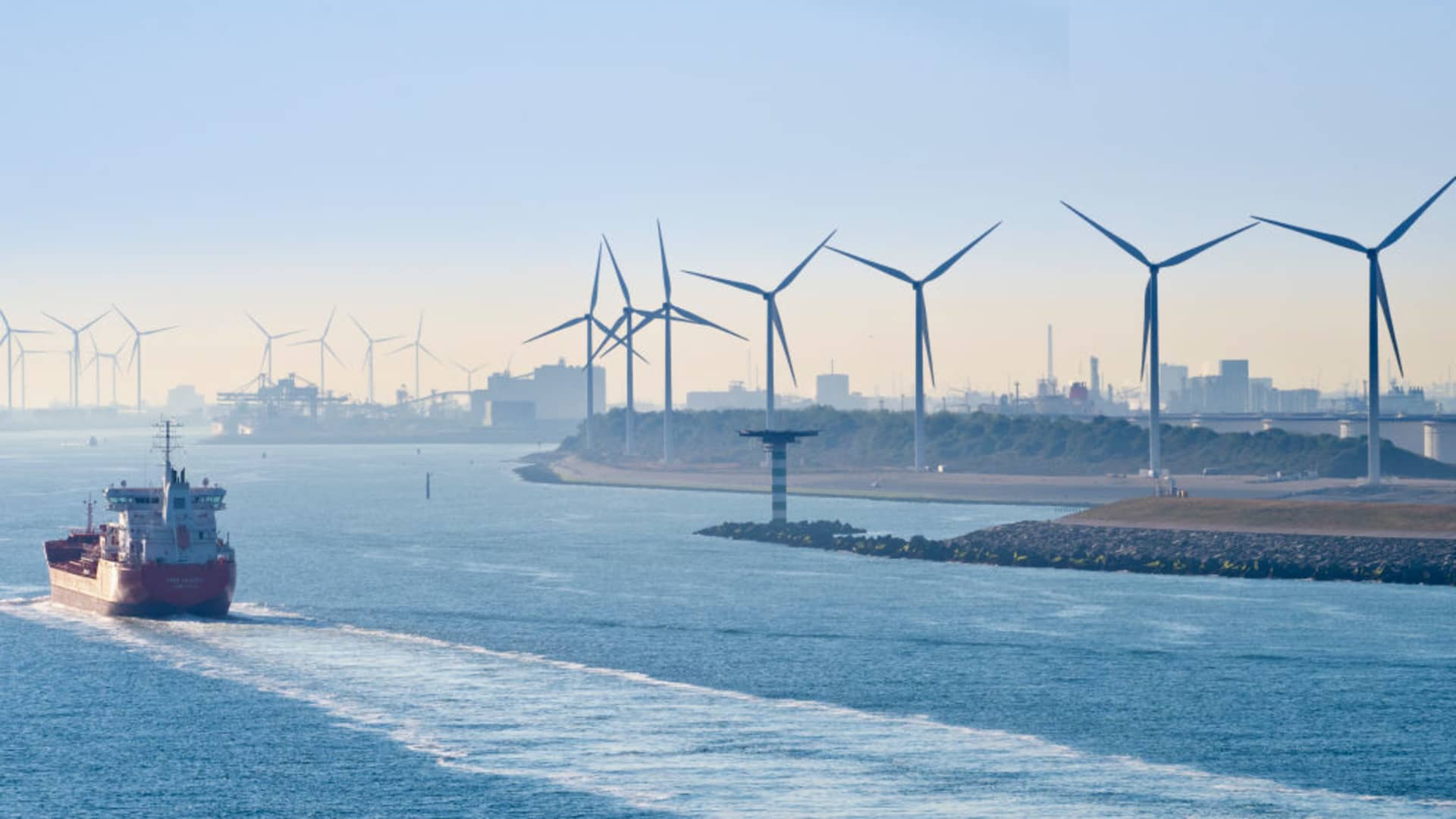
Countries at the meeting of the United Nations’ International Maritime Organization in London signed a deal for shipping emissions to reach net zero “by or around” 2050.
Ucg | Universal Images Group | Getty Images
A sweeping regulatory change in 2020 to slash air pollution from the world’s ships could have played a role in boosting global average temperatures, according to the findings of a controversial study.
Described at the time as the “biggest change in oil market history,” the International Maritime Organization (IMO) enforced new standards on Jan. 1, 2020, to cut their fuel sulfur content to 0.5%, down from 3.5%.
The rule change resulted in an 80% reduction in sulfur dioxide emissions, a team of scientists said in a paper published by the Communications Earth & Environment journal on May 30, and may help to explain why last year’s record-breaking heat was so extreme.
Tianle Yuan, a research scientist at the University of Maryland and the study’s lead author, said via social media that the impact of the clean air regulations could be described as “an inadvertent geoengineering event.”
That’s because the sulfur dioxide, a pollutant which forms when sulfur-containing fuel such as coal or petroleum oil is burned, reacts with water vapor to produce aerosols that reflect sunlight back into space.
The aerosols have a direct cooling effect, though climate scientists note that their contribution to global cooling or warming when they are reduced remains a complex area of research.
Describing this as accidental geoengineering, and presenting figures which may overestimate the impacts, could lead to misguided assumptions about policies intended to curb future emissions.
Laura Wilcox
Associate professor at the National Centre for Atmospheric Science at the University of Reading
The study said the abrupt fall in sulfur emissions since 2020 supports the viability of marine cloud brightening, a growing area of scientific interest which some researchers say could be used to help cool the planet.
The question over whether a reduction in sulfur dioxide emissions may have contributed to global warming is not new to climate scientists, but the debate has recently resurfaced following extreme heat waves across the North Atlantic and many areas of Europe.
Extreme temperatures are fueled by the climate crisis, the chief driver of which is the burning of fossil fuels.
Underestimated impact
“There are three interesting things that people are trying to pin down as to why 2023 was so alarmingly warm and the first one that everyone’s heard about is El Nino,” Jim Haywood, professor of atmospheric science at the U.K.’s University of Exeter, told CNBC via telephone.
“The second one is that people are not quite so aware of is Hunga Tonga, which was explosive volcanic eruption that was very unusual … And the third one is IMO shipping regulations,” Haywood said.
The El Nino weather phenomenon, a naturally occurring climate pattern that helped to fuel a spike in global temperatures, has recently been showing signs of ending, according to the U.N. weather agency. A swing back to the cooling influence of La Nina weather conditions is expected later this year.
Aerial top view container ship full speed with beautiful wave pattern for logistics, import export, shipping or transportation.
Suriyapong Thongsawang | Moment | Getty Images
“You’ve got these stellar climate scientists like [former NASA scientist] Jim Hansen arguing that we won’t get a rebound and the temperature trace won’t come back down into the pack — and I think I’m sort of with him on this one,” Haywood said.
“I think that there are so many ways that the aerosol cloud interactions could be underestimated in the climate models that it could have had an accelerating impact,” he added.
“It’s very hard to quantify exactly how much. All of the climate models will give you slightly different answers because of the way that they do their emissions of sulfur dioxide,” Haywood said. “So, we are uncertain about how much impact the IMO regulations will have had on global mean temperatures.”
IMO rules ‘only one contributing factor’
Scientists, who were not involved in the paper, broadly welcomed the study as timely but some said the research might exaggerate the impact of the IMO’s regulations.
Joel Hirschi, associate head of marine systems modelling at the U.K.’s National Oceanography Centre, said the study showed that the reduction of sulfur in ship fuel since 2020 was likely to have accelerated the warming of the planet.
However, Hirschi said the authors likely overestimated the impact the reduction of sulfur in ship fuel had on the record-breaking global temperatures witnessed last year and in 2024.
“The record high temperatures we have been witnessing in 2023 and 2024 are remarkable and they cannot be explained by a single factor. Research into why recent temperatures have been so high is ongoing and the reduced sulphur content in ship fuel is only one contributing factor,” Hirschi said.
Separately, Laura Wilcox, associate professor at the National Centre for Atmospheric Science at the U.K.’s University of Reading, said the study “makes very bold statements about temperature changes and geoengineering which seem difficult to justify on the basis of the evidence.”
“For many people, a shift to a lower-sulphur shipping fuel that causes less air pollution and reduces aerosol emissions is a move away from human-induced impacts on climate, as well as a move that cuts health impacts from air pollution,” Wilcox said.
“Describing this as accidental geoengineering, and presenting figures which may overestimate the impacts, could lead to misguided assumptions about policies intended to curb future emissions,” she added.
